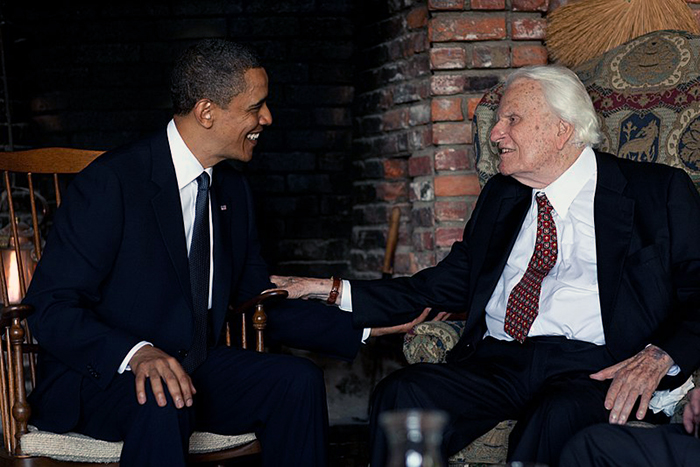(前編を読む)
保守的なクリスチャンが政治的に右派を支持するようになったことで、マクラレンの「幻滅」はより大きくなった。時間を2016年11月9日に早送りしよう。ドナルド・トランプが米大統領に選ばれた翌日、幻滅感が広がり、自分を「福音派」とする人の81%がトランプに票を投じたと知った福音派のリーダーたちの間で、それは怒りに変わった。
McLaren’s “disillusionment” was intensified by the increasing alignment of conservative Christians with politics of the right. Fast forward to November 9, 2016, the day after Donald Trump was elected president, and the disillusionment had spread, and had turned into anger for many evangelical leaders when we were told that 81 percent of voters who identified as “evangelical” voted for Trump.

2010年、ビリー・グラハムの自宅を訪れたバラク・オバマ米大統領(当時、写真:ホワイトハウス)
フラー神学校のマーク・ラバートン学長は、2018年にホイートン大学で行われた福音派リーダーの集会で、福音派の危機について要約した。彼はこれを「政治的取引」と呼び、福音派が政治権力を握ったこと、その人種差別や愛国主義、貧しい人への関心の欠如を挙げて酷評した。彼は明らかに保守的な福音派について語っていたが、彼を含む多くの福音派エリートにとって、今日の福音派の危機を作り上げているのは、まさに自分たちだったのだ。
Fuller Theological Seminary president Mark Labberton summarized the crisis of evangelicalism at a national gathering of evangelical leaders at Wheaton College in 2018. He called it “political dealing,” and he castigated evangelicals for grasping at political power, for racism, for nationalism, and for lack of concern for the poor. As is obvious, he was only talking about conservative evangelicals, but to him and many elite evangelicals, it is these evangelicals who constitute the crisis of evangelicalism today.
今日の危機が今までよりも深刻であることに疑問はない。福音派をリードする人たち(中でも、トランプ支持者とは距離を取ろうとしている人)がそのレッテルを剥(は)がそうとしている。彼らは「イエスのフォロワー」、「レッドレター・クリスチャン」、もしくは「ただのキリスト者」と呼ばれることを望んでいる。「福音派」と呼ばれることへの不快感は何年も前からあり、「ポスト福音派」「エマージェント(新しい)」に同調する人たちの間で嫌悪が始まった。だからこそ、これが発展して、このムーブメントの意味と将来について書かれた『まだ福音派? 政治的・社会的・神学的意味の再構想』(Still Evangelicals? Insiders Reconsider Political, Social, and Theological Meaning)が出版されたのだ(私も寄稿した)。


No question that the crisis today is more intense than it has ever been, with leading evangelicals (usually those who want to distance themselves from anyone who seems to support Donald Trump) dropping that label, preferring to be labeled as a “follower of Jesus” or a “red-letter Christian” or just “Christian.” That discomfort with the name has been around for years, starting with those who felt more attuned to labels like “post-evangelical” or “emergent.” So troublesome are these developments that InterVarsity Press commissioned a book devoted to the meaning and future of the movement: Still Evangelicals? Insiders Reconsider Political, Social, and Theological Meaning (of which I was a contributor).
もちろん他の人たちは、政治と神学的なことは、危機とは別なことだとしているし、20年ほど前に出版された『妥協した教会』(The Compromised Church: The Present Evangelical Crisis)もそうだった。ジョン・マッカーサー、マーク・デバー、デイビッド・ウェルス、アルバート・モーラー、フィリップ・ライケンらが寄稿した論集だ。彼らにとって、福音派教会は神学的にも聖書的にも礼拝でも底が浅くなってしまったとされたが、彼らの見解は自己への称賛も多かった。
Of course, others have located the crisis at the other end of the political and theological spectrum, and did so some 20 years earlier in The Compromised Church: The Present Evangelical Crisis, an anthology with contributions by John MacArthur, Mark Dever, David Wells, Albert Mohler, and Philip Ryken, among others. For these writers, the evangelical church had become shallow theologically, biblically, and in its worship. Their views also have a lot to commend themselves.
別な見解を示したのが、ジャーナリストで歴史家でもあるモリー・ウォーゼンだ。『理性の使徒──福音主義における権威の危機』(Apostles of Reason: The Crisis of Authority in Evangelicalism)」で、福音派に矛盾と混乱がはびこっているのは、信仰と生活を導くただ一人の権威者がこの運動には一度もいなかったからだと主張している。


Another view comes from journalist and historian Molly Worthen. In Apostles of Reason: The Crisis of Authority in Evangelicalism, she argues that evangelicalism is rife with contradictions and confusion because the movement has never has a single authority to guide its life and faith.
これは福音派ではない人の洞察ではあるが、福音派の人も「まあ、そうだ」と同意している。これが福音派の素晴らしいところでもあり、弱点でもある。聖書と、個人がそれを読むこと以外には、組織的な権威がないことでダイナミックな運動となり、それぞれの世代の文化において信仰が魅力的に形作られることとなったのだ。
This may have been an insight to non-evangelicals, but those in the movement just said, “Well, yeah.” This is the great strength and weakness of evangelicalism. Its lack of structured authority—with only the Bible and each person’s reading of it—has allowed it to be a dynamic movement that shapes the faith attractively to each generation and each culture. But that lack of a central authority inevitably creates arguments and divisions, and therefore in some ways an ongoing crisis.
これらが、この運動の内外で挙げられた危機の内実だ。それぞれの批評家は、複数の点で正しい。「クリスチャニティー・トゥデイ」の編集長として半世紀ものあいだ福音派の文化に浸っていた者として、数多い不満のそれぞれに大なり小なり真実があると私は感じている。簡単に片づけられるものではない。
These are but a few of the crises that those inside and outside the movement name. Each of the critics have been right in more than one respect. As editor in chief of Christianity Today, embedded in the culture of evangelicalism for over half a century, I recognize the measure of truth in each of these many complaints. They are not to be dismissed with a sweep of the hand.
政治的な危機ももちろんある(しかし私の見解では、それは右派にも左派にもある)。人種差別の危機もだ(白人の間には当然だが、少数民族の間でも多い)。神学的な危機もある。聖書的な危機も。そして礼拝の危機も(それだけでなく、薄っぺらいワーシップソングによるものも)。社会正義の危機も。牧会ケアの危機も。弟子訓練の危機も。まだまだ危機はある。
There is indeed a political crisis (but it’s both on the right and left in my view). And a crisis of racism (certainly among whites, but also increasingly among minorities). And a theological crisis. And a biblical crisis. And a crisis in worship (and not just because of thin worship songs). A crisis in marriage and family. A crisis in evangelism. A crisis in social justice. A crisis in pastoral care. A crisis in discipleship. And on it goes.
福音派の崩壊を予見する人も増えている。10年前、ブロガーの故マイケル・スペンサーは「福音主義の崩壊と、それが起こる理由」(The Coming Evangelical Collapse, and Why It Is Going to Happen)というエッセイを発表し、それがきっかけで福音派の生存率について、ソーシャル・メディア上で初めてやりとりが交わされるようになった。以下に一部を取り上げる。
Along the way, we’ve seen an increasing number of predictions of evangelical demise. Ten years ago, the late blogger Michael Spencer sparked one of the first social media conversations about the viability of evangelicalism with his essay, “The Coming Evangelical Collapse, and Why It Is Going to Happen.” Among other things, he said this:
「この崩壊は、西側世界のポスト・クリスチャンにおける反キリスト期の到来の予見になると信じている。そしてそれは、何千何百もの人々の宗教全体への見解を変えるだろう。自分の生きている間にはあり得ないだろうと思うような、キリスト教に対する不寛容が起こり、公共政策は福音派に対して特に敵対的になるだろう。そして、個人や社会の善に相反する者とますます思われるようになるだろう。
This collapse, will, I believe, herald the arrival of an anti-Christian chapter of the post-Christian west and will change the way tens of millions of people see the entire realm of religion. Intolerance of Christianity will rise to levels many of us have not believed possible in our lifetimes, and public policy will become particularly hostile towards evangelical Christianity, increasingly seeing it as the opponent of the good of individuals and society.
この新しい環境への福音派の応答は、1980年代に現代文化との戦いが始まった頃の反応や誇張の再来となるだろう。その頃との違いが何かと言えば、何百万という福音派クリスチャンが教会をやめ、福音派的特徴へのこだわりをやめ、文化の波に逆らうことをやめることだ。
The response of evangelicals to this new environment will be a revisiting of the same rhetoric and reactions we’ve seen since the beginnings of the current culture war in the 1980s. The difference will be that millions of evangelicals will quit: quit their churches, quit their adherence to evangelical distinctives and quit resisting the rising tide of the culture.
福音派を去る人の多くは、宗教そのものから去る。個人的にキリスト教信仰やキリスト教の影響を激しく否定して、無神論や不可知論的な世俗主義に向かう者もいるだろう。私たちの子どもや孫の多くがこの船を捨て去り、また多くの人が『あばよ』と言って立ち去るだろう」
Many who will leave evangelicalism will leave for no religious affiliation at all. Others will leave for an atheistic or agnostic secularism, with a strong personal rejection of Christian belief and Christian influence. Many of our children and grandchildren are going to abandon ship, and many will do so saying “good riddance.”
彼がこの記事を書いた時、私には疑いがあったので、出版物にもそのように書いた。しかし今日、私はスペンサーが正しかったことを認めざるを得ない。最近のイベントや調査は、彼の予見から生じたものが多い。私たちは本当に、米国の福音派の危機的状況にいるのだ。
I was skeptical at the time he wrote this, and said so in print. But today I admit that Spencer was more right than he was wrong. Recent events and surveys bear out many of his predictions. We truly are in a moment of crisis in the American evangelicalism.
はっきり言っておくが、私にはこのゲームに費やす一切の金銭がない。つまり、多くの人が予想するとおり、米国の福音派と呼ばれるこの運動が日没とともに消え去ったとしても、私には何の関わりもないのだ。ペンテコステからこのかた、神は多くの改革運動を起こしてきたし、そしてそれらが死にゆくのもご覧になってきた。そのうちのいくつかは神ご自身が抹殺したのだろうと私は考えている。もし福音派が消え去るなら、神はその憐れみをもって他の運動を起こし、ご自分の民をよみがえらせるだろう。米国の教会の未来にとって、福音派の健全さが重要なのではない。重要なのは神の力だ。そうだとすれば、私たちに心配することなどない。
To be clear, I have no money in this game, meaning it doesn’t matter to me if, as many predict, the movement known as American evangelicalism fades away with the sunset. God has raised up many reform movements since the day of Pentecost, and has seen many die—some of which I suspect he has killed off. If evangelicalism fades away, he will in his mercy raise up another movement that will revive his people. The future of the church in America does not hinge on the health of evangelicalism; it hinges on the power of God. I’d say we’re in good hands.
米国の福音派は独自のスタートを切り、それにエネルギーを与えて2世紀以上も続けられてきた。教会の歴史の中では革命的な運動だったといえるだろう。北米のキリスト教を変えただけでなく、世界中に広がった19世紀の宣教運動も変えたからだ。多くの人が指摘したように、この歴史にはたくさんのトラブルもあった。罪人による運動なのだから、驚くことではない。しかし、神は良い方であり、他の追随を許さないイエス・キリストの恵みを、人生を歩むすべての人、世界の隅々にいる人にまで届けるために、この運動を用いてくださった。
That being said, American evangelicalism has had a unique beginning, one that energized it and carried it along for two centuries and more. And it has been one of the most revolutionary movements in church history, changing the face not only of North American Christianity, but with the 19th century missionary movement, the entire globe. This history has many troubling elements, as many have pointed out. This is not surprising, because it is a movement full of sinners. But God has been good and has nonetheless used it to enable people from all walks of life and every corner of the world to know the unsurpassable grace of Jesus Christ.
現代の福音派は深刻な問題を抱えている。事実、この危機は、米国におけるすべてのキリスト教を苦しめている。傲慢(ごうまん)に聞こえるかもしれないし、ただ単に無限にも見える危機のリストにもう一つアイテムを加えるだけなのかもしれないが、米国の教会の大部分を苦しめているものがこの危機であると私は信じている。アレキサンダー・ソルジェニーツィンが1968年にテンプルトン賞を授与された時にスピーチで述べたことと同じだ。彼は西側文化を指してこう言ったのだが、私は、福音派であろうとなかろうと、米国の教会を指して言おう。
Still, contemporary evangelicalism is in serious trouble. Actually, its crisis is the same one that afflicts all Christianity in America. At the risk of hubris, and the risk of merely adding one more item to the seemingly endless list of crises, in this book, I believe that the crisis lies at the heart of what ails large swaths of the American church. Alexander Solzhenitsyn named it in his speech upon receiving the Templeton Prize in Religion in 1968. He was talking about Western culture when he used it. I apply it to the American church, evangelical and not:
我々は神を忘れてしまったのだ。(前編に戻る)

マーク・ガリ
執筆者のマーク・ガリは「クリスチャニティ-・トゥデイ」の編集長。
本記事は「クリスチャニティー・トゥデイ」(米国)より翻訳、転載しました。翻訳にあたって、多少の省略をしています。
出典URL:https://www.christianitytoday.com/ct/2019/may-web-only/elusive-presence-1-heart-of-evangelical-crisis.html
「クリスチャニティー・トゥデイ」(Christianity Today)は、1956年に伝道者ビリー・グラハムと編集長カール・ヘンリーにより創刊された、クリスチャンのための定期刊行物。96年、ウェブサイトが開設されて記事掲載が始められた。雑誌は今、500万以上のクリスチャン指導者に毎月届けられ、オンラインの購読者は1000万に上る。
関連






























